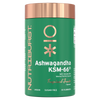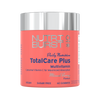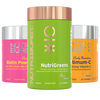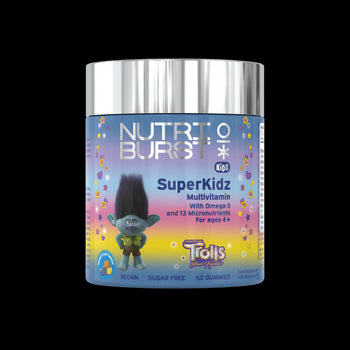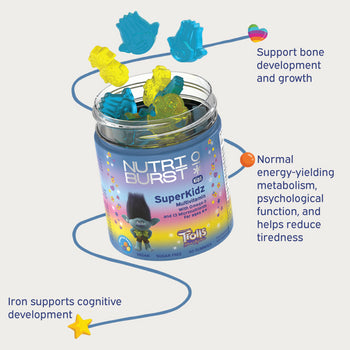Back to school nutrition
Written by Christianna

After six weeks of summer holidays, lots of fun and probably more treats than usual, the return to school in September is a great time to get back to routine and reset our intentions when it comes to our and our children’s nutrition. Heading into autumn, as kids get back into classrooms, we see an increase in contagious illnesses so it’s a crucial time to support their health and immune system to help them keep the germs at bay. It's also when the weather changes and they are less exposed to sunshine, which is the best source of vitamin D, a vital nutrient when it comes to immune function. So, as well as overall nutrition, this is the first thing I focus on, but as Vitamin D is difficult to get from food, we get our daily vitamin D from supplements.
Being back at school is physically and mentally demanding for children so we need to make sure we provide them with the nutrition they need, and my starting point is planning meals around the school day.
For children, breakfast can be so important; they need food to provide energy and get them through the morning. Although adrenaline can be high which is what helps wake us up, energy reserves are low after an overnight fast, and what can happen when kids skip breakfast is that by mid-morning, they are so depleted they struggle to concentrate, and it can even affect behaviour. The challenge is, that in most households, mine included, mornings are chaotic and with the best will in the world we rarely have more than a few minutes for breakfast. This is where prep-ahead breakfasts come in – balanced, nutritious breakfasts that you can easily make ahead of time and have in the fridge. My favourites are homemade granola bars, overnight oats, Greek yoghurt parfait and chia pudding. Make a few at the weekend and have them in the fridge ready to go on a busy weekday morning. It’s an absolute game changer – not just in terms of getting kids' daily nutrition off to a good start, but also in reducing stress levels in the morning.
Then we have lunch. It's often overlooked but when we consider there are an average of 190 school days in the academic year - that’s 190 meals! Lunch is a main meal and should be nutritionally balanced, tasty and enjoyable. It’s not just a stopgap to dinner, it’s an opportunity to nourish our growing children (and ourselves!) By lunchtime, even if kids have had a filling breakfast, they have built up an appetite so lunch should satisfy that hunger while also fuelling their bodies and minds, providing enough energy for the rest of the afternoon. If your child has school meals, you can feel pretty confident that they will have some healthy options. If you are making a packed lunch, there are a few things to keep in mind. Regarding energy, carbohydrates are the body’s and mind’s preferred source of energy, so it’s important to include sufficient complex carbohydrates, things like wholegrain bread or wrap, whole grain pasta, potatoes, oatcakes etc. So that’s carbs taken care of; to make the meal nutritionally balanced don’t forget protein and a little healthy fat. All three are important for overall health but also how our kids feel in the afternoon. For me, packed lunches have to be simple, and my all-time favourite hack is to make a little extra dinner which I send to school the next day in a thermos. I also always add a healthy treat like a dried fruit snack, which is the perfect added bit of fuel for the school afternoon.
And while we’re on the afternoon subject, let’s talk about snacks. Most kids are hungry as soon as they come out of school. Parents often find this surprising but it's perfectly normal and it happens because kids are growing, and their base metabolic rate is so high - up to 50% more than adults so they are burning through energy -and food- at a much faster rate. To make your life easier and make sure your kids are making snack choices you feel good about, have some easy go-to options. This is the time of day I love to give my kids a snack plate that includes fruit, vegetables, hummus, nuts, oat cakes… They’re hungry and will happily eat and enjoy it. Or one of the options I mentioned earlier as prep ahead breakfasts would also make a perfect afternoon snack.
Finally, we have dinner, and it won’t surprise you to hear that my advice will be to balance it the same way you did lunch: complex carbs, sufficient protein and healthy fats; make sure you include lots of veggies and aim for variety across the week. One more thing that is worth considering when it comes to dinner is timing. This will vary depending on the age of your children, but I suggest you experiment with times to find what works for your family, an earlier dinner and then a pre-bedtime snack or an afternoon snack and later dinner. It can have a profound effect on energy levels throughout the evening and even affect sleep.
When it comes to children’s nutrition, the best piece of advice I have to share is to get kids involved, give them tasks, something as simple as chopping the dinner vegetables or more challenging such as researching what’s in season that month and finding a new recipe they would like to try. This is the start of a healthy relationship with food and an investment in their future health.
All that being said, even as a nutritionist I know I don't always get my family’s nutrition 100% every day. I also know that even if I did my best, I’m not likely to get all my nutrients every day; there are too many variables with food. So, supplements are a part of my and my children’s wellness routine, and a quality multivitamin is a great starting point. I consider them my insurance policy to make sure we are giving our bodies everything they need to stay healthy.
When it comes to our supplements; I take the same approach as I do with our food, I plan them into our day, it's part of our routine like anything else that’s important. And just like food, for supplements to be effective and work their magic, we have to take them consistently. Make it easy to remember to take them; by storing them somewhere you’ll see them every day. I truly believe that our nutrition is one of the most powerful influences on how we feel, how we learn, and how we interact with each other. And although we might lose sight of that a little over the summer holidays, September is the perfect time to reset and get back into a healthy routine.

